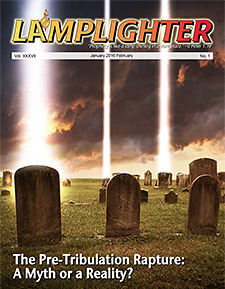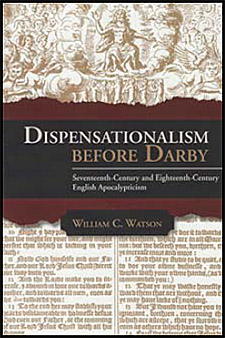An Update on the Origin of the Pre-Tribulation Rapture
The Research of Dr. William C. Watson

After I had finished writing the feature article in this issue, I was introduced to a phenomenal new book by Dr. William C. Watson entitled, Dispensationalism before Darby: Seventeenth-Century and Eighteenth-Century English Apocalypticism (Silverton, OR: Lampion Press, 2015, 341 pages).
This is a scholarly book that is not intended for the general reader. Dr. Watson earned a B.A. degree in history from California Polytechnic State University, an M.Div. from Talbot School of Theology, an M.A. in European history and a Ph.D. in 17th and 18th Century English history from the University of California, Riverside.
While he served as a graduate student in the 1980s and early 90s, he helped compile the Short Title Catalogue of English Works published between 1473 and 1800. He has served as a Fulbright Scholar to Moldova and as an adjunct instructor at the University of Colorado, Boulder. For the past 20 years, he has been a professor at Colorado Christian University.
Specialized Research
During the past decade, Dr. Watson has focused on researching historical archives in the United Kingdom concerning the eschatology of English clergy during the 17th and 18th Centuries. In the process, he discovered many Bible prophecy books that had been overlooked, misplaced or forgotten for the past three hundred years.
Dr. Watson used more than 350 primary sources in compiling his new book (page viii), and he quotes these sources at length to provide context. Concerning the concept of a Pre–Tribulation Rapture, he concludes that “very little of what John Nelson Darby taught in the mid–nineteenth century was new” (page 177). He points out that most of the sources that he quotes in the book have not been previously cited in the debate about the origin of the Pre–Trib Rapture — “most likely because they have not been read for centuries” (page 177).
The Results of the Research
His research clearly shows that by the end of the 17th Century, the concept of a Rapture that is separate and apart from the Second Coming had become a commonplace concept. He names seven authors who held a “pre–conflagration” view of a rapture that would take the saints out of the world before it was consumed by fire. He identifies six other authors who were “clearly Pre–Trib.” And he names four who were not Pre–Trib but who refer in their writings to the existence of others who were. He notes that the use of the word, Rapture, was also widespread, with some even referring to those who would be “left behind” (pages 177–178).

This interpretation of a Rapture separate and apart from the Second Coming continued to be espoused by Bible prophecy experts throughout the 18th Century. Their timing of the Rapture varied, but by the end of the century, “more than a generation before Darby, belief in a Rapture of the church before a great tribulation was commonplace in Britain” (page 262). In fact, Dr. Watson demonstrates that “the belief was held not only by Baptists…but also by leading Anglicans…and even by Scottish Presbyterians…(page 262).
Historian Paul Boyer had already come to this conclusion in his book, When Time Shall Be No More; Prophecy Belief in Modern American Culture (Cambridge, MA: Harvard University Press, 1994). He wrote (page 88):
In a sense, Darby’s system contained nothing new. His focus on the future fulfillment of prophecy followed the eschatology of the early Christians. Premillennialism had been an option for Protestant evangelicals since Joseph Mede’s day (1586–1639), while rudimentary forms of “Dispensationalism” go back at least as far as Joachim of Fiore (1135–1202). Even Rapture doctrine…can be found in the writings of early interpreters, including Increase Mather (1639–1723). But Darby wove these diverse strands into a tight and cohesive system that he buttressed at every point by copious biblical proof texts, then tirelessly promoted through his writings and preaching tours.
The point is that the concept of a Pre–Trib Rapture did not simply drop from the sky into John Darby’s lap in the 1830s. It was a concept that had been slowly developing over a several hundred years in the writings of Bible prophecy scholars from a variety of Christian traditions.
Conclusion
The idea that the concept of a Pre–Tribulation Rapture originated with a couple of Jesuit priests, that it was reinforced by the ravings of a 15 year old demon possessed girl, and that it was put in its final form by a defrocked Presbyterian minister is, to put it mildly, absurd.
And in the process, the scholars who did develop the concept were not developing anything new. Rather, they were restoring a lost truth — just as did Martin Luther.




